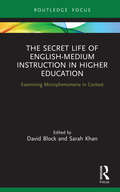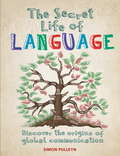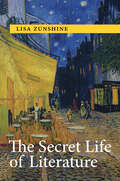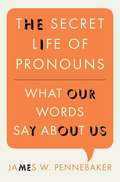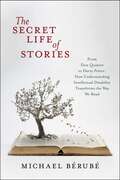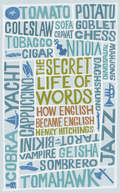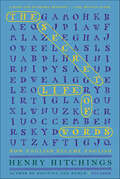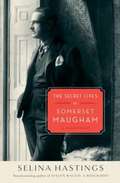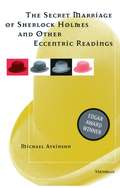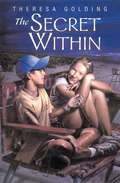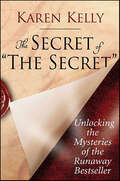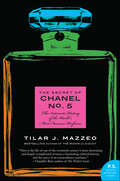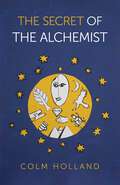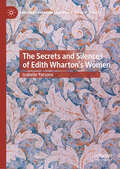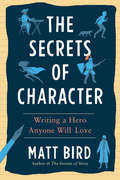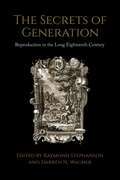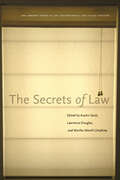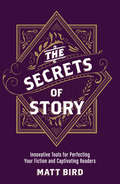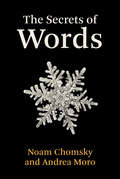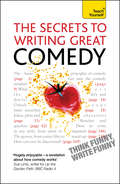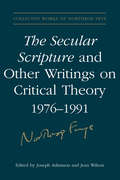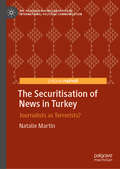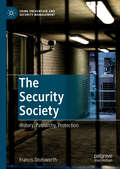- Table View
- List View
The Secret Life of English-Medium Instruction in Higher Education: Examining Microphenomena in Context (Routledge Focus on English-Medium Instruction in Higher Education)
by David Block and Sarah KhanThis volume explores the inner-workings of English-medium instruction (EMI) in higher education (HE) at two universities. After an introductory chapter that sets the scene and provides an essential background, there are four empirically based chapters that draw on data collected from a range of sources at two universities in Catalonia. This includes, interviews, audio/video recordings of classes, audio logs produced by both lecturers and students, policy documents, students’ written work, and student presentation evaluation rubrics. These chapters examine the following issues: (1) the choice of either English or Catalan as the medium of instruction by students and lecturers; (2) how students display ambivalence towards EMI, as well as a general lack of enthusiasm towards and an ironic distance from 'doing education’; (3) how students resist EMI by contravening its English monolingual norm, using their L1s in the classroom; and finally, (4) how EMI lecturers on occasion act as English language teachers despite their continued claims to the contrary. The book ends with a concluding chapter that draws all of the strands together around key themes. This book is written for scholars interested in issues surrounding EMI in HE in general, as well as those EMI in HE practitioners who have adopted a reflective approach to their professional practice and wish to know more about the ins and outs of EMI in HE from multiple perspectives. It is a useful resource for MA and PhD students of applied linguistics programmes in which the roles and uses of English in higher education worldwide are deemed to be important and worthy of attention. Additionally, this will be relevant to courses or modules focusing on language policy, as well as curriculum issues more broadly and language teaching practice more specifically.
The Secret Life of Language (Secret Life of)
by Simon PulleynThis book looks at how language has evolved around the globe from ancestral proto-languages to our recognisable modern tongues. It demonstrates how language has been shaped by social and cultural influences, and even explains how our anatomy affects the articulation, and therefore evolution, of words. Discover the surprising stories behind theorigin of the written word, the difficulties of decipherment and the challenge of inventing from scratch languages such as Dothraki.Combining expert analysis with accessible narrative and fun illustrations, The Secret Life of Language makes even the complex topics of philology, morphology and phonology easy to understand.
The Secret Life of Language: Discover The Origins Of Global Communication (The\secret Life Of Ser.)
by Simon PulleynThis book looks at how language has evolved around the globe from ancestral proto-languages to our recognisable modern tongues. It demonstrates how language has been shaped by social and cultural influences, and even explains how our anatomy affects the articulation, and therefore evolution, of words. Discover the surprising stories behind theorigin of the written word, the difficulties of decipherment and the challenge of inventing from scratch languages such as Dothraki.Combining expert analysis with accessible narrative and fun illustrations, The Secret Life of Language makes even the complex topics of philology, morphology and phonology easy to understand.
The Secret Life of Literature
by Lisa ZunshineAn innovative account that brings together cognitive science, ethnography, and literary history to examine patterns of &“mindreading&” in a wide range of literary works.For over four thousand years, writers have been experimenting with what cognitive scientists call &“mindreading&”: constantly devising new social contexts for making their audiences imagine complex mental states of characters and narrators. In The Secret Life of Literature, Lisa Zunshine uncovers these mindreading patterns, which have, until now, remained invisible to both readers and critics, in works ranging from The Epic of Gilgamesh to Invisible Man. Bringing together cognitive science, ethnography, and literary studies, this engaging book transforms our understanding of literary history. Central to Zunshine&’s argument is the exploration of mental states &“embedded&” within each other, as, for instance, when Ellison&’s Invisible Man is aware of how his white Communist Party comrades pretend not to understand what he means, when they want to reassert their position of power. Paying special attention to how race, class, and gender inform literary embedments, Zunshine contrasts this dynamic with real-life patterns studied by cognitive and social psychologists. She also considers community-specific mindreading values and looks at the rise and migration of embedment patterns across genres and national literary traditions, noting particularly the use of deception, eavesdropping, and shame as plot devices. Finally, she investigates mindreading in children&’s literature. Stories for children geared toward different stages of development, she shows, provide cultural scaffolding for initiating young readers into a long-term engagement with the secret life of literature.
The Secret Life of Pronouns: What Our Words Say About Us
by James W. PennebakerIn "The Secret Life of Pronouns," linguistic and social psychologist Pennebaker uses his groundbreaking research in computational linguistics--in essence, counting the frequency of words we use--to show that our language carries secrets about our feelings, our self-concept, and our social intelligence.
The Secret Life of Stories: From Don Quixote to Harry Potter, How Understanding Intellectual Disability Transforms the Way We Read
by Michael BérubéHow an understanding of intellectual disability transforms the pleasures of readingNarrative informs everything we think, do, plan, remember, and imagine. We tell stories and we listen to stories, gauging their “well-formedness” within a couple of years of learning to walk and talk. Some argue that the capacity to understand narrative is innate to our species; others claim that while that might be so, the invention of writing then re-wired our brains. In The Secret Life of Stories, Michael Bérubé tells a dramatically different tale, in a compelling account of how an understanding of intellectual disability can transform our understanding of narrative. Instead of focusing on characters with disabilities, he shows how ideas about intellectual disability inform an astonishingly wide array of narrative strategies, providing a new and startling way of thinking through questions of time, self-reflexivity, and motive in the experience of reading. Interweaving his own stories with readings of such texts as Faulkner’s The Sound and the Fury, Haddon’s The Curious Incident of the Dog in the Night-Time, Kingston’s The Woman Warrior, and Philip K. Dick’s Martian Time-Slip, Bérubé puts his theory into practice, stretching the purview of the study of literature and the role of disability studies within it.Armed only with the tools of close reading, Bérubé demonstrates the immensely generative possibilities in the ways disability is deployed within fiction, finding in them powerful meditations on what it means to be a social being, a sentient creature with an awareness of mortality and causality—and sentience itself. Persuasive and witty, Michael Bérubé engages Harry Potter fans and scholars of literature alike. For all readers, The Secret Life of Stories will fundamentally change the way we think about the way we read.
The Secret Life of Words: How English Became English
by Henry HitchingsCommunication is essential to our lives, but how often do we stop to think about where the words we use have come from? Have you ever thought about which words in English have been borrowed from Arabic, French or Dutch? Try admiral, landscape and marmalade just for starters. The Secret Life of Words is a wide-ranging account not only of the history of English, but also of how words witness history, reflect social change and remind us of our turbulent past. Henry Hitchings delves into our promiscuous language and reveals how and why it has absorbed words from more than 350 other languages many originating from the most unlikely of places, such as shampoo from Hindi and kiosk from Turkish.From the Norman Conquest to the present day, Hitchings narrates the story of English as an archive of our human experience and uncovers the secrets behind everyday words. This is a celebration of our language; after reading it, you will never again take the words we use for granted.
The Secret Life of Words: How English Became English
by Henry HitchingsWords are essential to our everyday lives. An average person spends his or her day enveloped in conversations, e-mails, phone calls, text messages, directions, headlines, and more. But how often do we stop to think about the origins of the words we use? Have you ever thought about which words in English have been borrowed from Arabic, Dutch, or Portuguese? Try admiral, landscape, and marmalade, just for starters. The Secret Life of Words is a wide-ranging account not only of the history of English language and vocabulary, but also of how words witness history, reflect social change, and remind us of our past. Henry Hitchings delves into the insatiable, ever-changing English language and reveals how and why it has absorbed words from more than 350 other languages—many originating from the most unlikely of places, such as shampoo from Hindi and kiosk from Turkish. From the Norman Conquest to the present day, Hitchings narrates the story of English as a living archive of our human experience. He uncovers the secrets behind everyday words and explores the surprising origins of our most commonplace expressions. The Secret Life of Words is a rich, lively celebration of the language and vocabulary that we too often take for granted.
The Secret Lives of Somerset Maugham: A Biography
by Selina HastingsHe was a brilliant teller of tales, one of the most widely read authors of the twentieth century, and at one time the most famous writer in the world, yet W. Somerset Maugham’s own true story has never been fully told. At last, the fascinating truth is revealed in a landmark biography by the award-winning writer Selina Hastings. Granted unprecedented access to Maugham’s personal correspondence and to newly uncovered interviews with his only child, Hastings portrays the secret loves, betrayals, integrity, and passion that inspired Maugham to create such classics as The Razor’s Edge and Of Human Bondage.Hastings vividly presents Maugham’s lonely childhood spent with unloving relatives after the death of his parents, a trauma that resulted in shyness, a stammer, and for the rest of his life an urgent need for physical tenderness. Here, too, are his adult triumphs on the stage and page, works that allowed him a glittering social life in which he befriended and sometimes fell out with such luminaries as Dorothy Parker, Charlie Chaplin, D. H. Lawrence, and Winston Churchill.The Secret Lives of Somerset Maugham portrays in full for the first time Maugham’s disastrous marriage to Syrie Wellcome, a manipulative society woman of dubious morality who trapped Maugham with a pregnancy and an attempted suicide. Hastings also explores Maugham’s many affairs with men, including his great love, Gerald Haxton, an alcoholic charmer and a cad. Maugham’s courageous work in secret intelligence during two world wars is described in fascinating detail—experiences that provided the inspiration for the groundbreaking Ashenden stories. From the West End to Broadway, from China to the South Pacific, Maugham’s restless and remarkably productive life is thrillingly recounted as Hastings uncovers the real stories behind such classics as “Rain,” The Painted Veil, Cakes & Ale, and other well-known tales.An epic biography of a hugely talented and hugely conflicted man, The Secret Lives of Somerset Maugham is the definitive account of Maugham’s extraordinary life.From the Hardcover edition.
The Secret Marriage of Sherlock Holmes
by Michael AtkinsonThe Secret Marriage of Sherlock Holmesis about reading, a process that we take for granted. But Sherlock Holmes, the cultural icon to whose exploits Michael Atkinson gives new readings, became famous by taking nothing for granted. Holmes's adventures can be read in new ways, including ways that he himself would have found startling, but which can give contemporary readers satisfaction. In clear, accessible prose that will engage specialists and lay readers alike, Atkinson engages in "a series of flirtations" with nine of Arthur Conan Doyle's favorite detective fictions, using the tools of modern literary theory, from depth psychology to deconstruction. Bluebeard, the kundalini serpent, and Conan Doyle's mother pop up alongside Jung, Nietzsche, and Derrida as guides to new understandings of these classic stories. Just as Holmes uses treatises on tobacco ash and tattoos to give fresh readings to puzzling facts, Atkinson employs widely different critical strategies to unravel the mysteries of reading itself. "What a delightful book! This is surely the most interesting writing you will ever read about Sherlock Holmes, but it is much more. Michael Atkinson gives us literary criticism at its best: the sheer fun of watching a bold and imaginative reader breathe into well-loved, but well-worn, fictions new and enchanting life. Atkinson's mind races as nimbly as Holmes's own, and he makes the stories our hansom cab through human nature itself. A tour de force!" --Norman N. Holland, author ofMurder in a Dephi Seminar "A book that speaks directly to readers. . . Atkinson sees far beneath the surface of the Sherlock stories to provide fascinating commentary. " --Cincinnati Post "Atkinson demonstrates a love and knowledge of the Holmes stories. . . I would recommend The Secret Marriage of Sherlock Holmes enthusiastically to any lover of the Canon who is prepared to have their perceptions widened. " --Mystery Writers of America Michael Atkinson is Professor of English and Comparative Literature, University of Cincinnati. For additional news, reviews and related Sherlockiana (leaving Press site): Additional information supplied by the author- http://ucaswww. mcm. uc. edu/English/Holmes/ http://ucaswww. mcm. uc. edu/English/Holmes/"
The Secret Within
by Theresa Martin GoldingCarly Chambers has a secret. With her family constantly on the move and father's harsh rules keeping her close to home, it had been an easy secret to keep. Until now. This summer in a beach town on the Jersey coast everything is unraveling. Slipping out of her bedroom window each night, Carly only wants to steal a few hours of freedom on the boardwalk. Then comes the night when she discovers that a stranger has been watching her every move and asking questions about her. Carly is caught in a dangerous game of hiding from the stranger and dodging her abusive father. In this compelling novel by Theresa Martin Golding, Carly Chambers discovers that sometimes the only thing worse than revealing a painful secret--is keeping it.
The Secret of "The Secret": Unlocking the Mysteries of the Runaway Bestseller
by Karen KellyThe bestselling blockbuster The Secret by Rhonda Byrnes has taken America by storm. The Secret of "The Secret" explores the explosive success of The Secret as well as the intriguing people and ideas behind it.The Secret has already become a runaway sensation. All across America, people are clamoring to embrace it. Karen Kelly delves into this extraordinary phenomenon -- What IS the secret? Where did it come from and does it really work? The Secret of "The Secret" also investigates why this little book, particularly in America, has struck such a chord--does hope always spring eternal in the U.S.? What is it about our culture that has historically drawn us to seek answers and change our destiny using the power of the mind and the universe? Scholars and popular culture experts provide perspective on what makes the idea so appealing.Several participants from The Secret share their behind-the-scenes stories and insights. Renowned psychologists, scientists, and theologians, weigh in on the power and limits of positive thinking and The Law of Attraction (the basis behind The Secret). Uncover the scientific and religious roots that form the building blocks of The Secret, as experts evaluate the author's claims about the various connections between these principles and "the secret."Finally, the answers to the burning questions behind one of the biggest success stories of our time have arrived. Discover The Secret of "The Secret."
The Secret of Chanel No. 5: The Intimate History of the World's Most Famous Perfume
by Tilar J. Mazzeo“Who knew that such a tiny bottle housed so many secrets?” —Michael Tonello, author of Bringing Home the BirkinTilar J. Mazzeo, author of the New York Times bestseller The Widow Clicquot (an Amazon Best of the Month book in October 2008) returns with a captivating history of the world’s most famous, seductive, and popular perfume: Chanel No. 5. Mazzeo’s sweeping story of the iconic scent (known as “le monstre” in the fragrance industry) stretches from Coco Chanel’s early success to the rise of the seminal fragrance during the 1950s to the confirmation of its bestseller status in today’s crowded perfume market.“Here is the life of one of the 20th century’s most interesting and deeply complicated women, a fascinating cultural history, and the story of an extraordinary perfume.” —Chandler Burr, New York Times scent critic and author of The Perfect Scent
The Secret of The Alchemist: Uncovering The Secret in Paulo Coelho's Bestselling Novel 'The Alchemist'
by Colm Holland"This heartfelt book, never left my bedside for the duration of the read... Colm is a force of goodness and his strength and determination has a way of helping the reader feel safe and held throughout this journey of transformation."Lady Marina Cowdray, International Adviser to the Oxford Centre of Mindfulness and founder of Cowdray Hall WellbeingIn The Secret of The Alchemist, Colm Holland reveals how you can discover the power to miraculously change the world around you beyond all recognition and for the better. Colm will tell you the story of his encounter with Paulo Coelho and his bestselling book The Alchemist and how discovering the secret in Paulo's novel gave him the insights to achieve true empowerment in his life. Alchemy is all about transformation and draws upon the greatest power of all to convert seemingly insurmountable obstacles into life changing experiences. Through an honest account of his own, often difficult quest to live life to the full, Colm offers you the chance to draw on his discoveries and other real-life stories to inspire the pursuit of your dreams and reach your goals. How does he know? As he wrote this book, Colm asked Love to give you, the reader, everything you need to become the alchemist in your world.
The Secrets and Silences of Edith Wharton's Women (American Literature Readings in the 21st Century)
by Isabelle ParsonsEdith Wharton’s sensitively observed portraits of women’s lives a century ago resonate into the present day, captivating readers now as they did then. Threaded throughout her accounts is a rich seam of secrets and silences that reveals Wharton’s keen grasp of the realities navigated by women, and her astute use of withholding to tell their stories. This book explores her frequent marshalling of secrets and silences, presented as an integral part of her literary aesthetic, to cast light on her enduring interest in women’s experiences in private and public settings during the early twentieth century.
The Secrets of Character: Writing a Hero Anyone Will Love
by Matt BirdAn insightful and actionable guide to creating a hero that readers will fall in love with, from the author of The Secrets of StoryThe hardest yet most essential element of writing great fiction is character – specifically, creating a central hero who is relatable, compelling, and worth the reader&’s precious time. In this entertaining and practical guide, popular blogger, writing coach and screenwriter Matt Bird breaks down what makes characters embraceable and unforgettable, and presents insider tips and tricks for writers of all levels and genres. Generously packed with examples from popular books and movies analyzed with engaging specificity, this expert guide reveals what makes audiences believe, care, and invest in great characters – and how to bring your own characters vividly to life.
The Secrets of Generation
by Darren Wagner Raymond StephansonFrom theories of conception and concepts of species to museum displays of male genitalia and the politics of breastmilk, The Secrets of Generation is an interdisciplinary examination of the many aspects of reproduction in the eighteenth century.Exploring the theme of generation from the perspective of histories of medicine, literature, biology, technology, and culture, this collection offers a range of cutting-edge approaches. Its twenty-four contributors, scholars from across Europe and North America, bring an international perspective to discuss reproduction in British, French, American, German, and Italian contexts.The definitive collection on eighteenth-century generation and its many milieus, The Secrets of Generation will be an essential resource for studying this topic for years to come.
The Secrets of Law
by Austin Sarat Lawrence Douglas Martha Merrill UmphreyThe Secrets of Law explores the ways law both traffics in and regulates secrecy. Taking a close look at the opacity built into legal and governance processes, it explores the ways law produces zones of secrecy, the relation between secrecy and justice, and how we understand the inscrutability of law's processes. The first half of the work examines the role of secrecy in contemporary political and legal practices-including the question of transparency in democratic processes during the Bush Administration, the principle of public justice in England's response to the war on terror, and the evidentiary law of spousal privilege. The second half of the book explores legal, literary, and filmic representations of secrets in law, focusing on how knowledge about particular cases and crimes is often rendered opaque to those attempting to access and decode the information. Those invested in transparency must ultimately cultivate a capacity to read between the lines, decode the illegible, and acknowledge both the virtues and dangers of the unknowable.
The Secrets of Story: Innovative Tools for Perfecting Your Fiction and Captivating Readers
by Matt BirdYou've just boarded a plane. You've loaded your phone with your favorite podcasts, but before you can pop in your earbuds, disaster strikes: The guy in the next seat starts telling you all about something crazy that happened to him--in great detail. This is the unwelcome storyteller, trying to convince a reluctant audience to care about his story. We all hate that guy, right? But when you tell a story (any kind of story: a novel, a memoir, a screenplay, a stage play, a comic, or even a cover letter), you become the unwelcome storyteller. So how can you write a story that audiences will embrace? The answer is simple: Remember what it feels like to be that jaded audience. Tell the story that would win you over, even if you didn't want to hear it.The Secrets of Story provides comprehensive, audience-focused strategies for becoming a master storyteller. Armed with the Ultimate Story Checklist, you can improve every aspect of your fiction writing with incisive questions like these: Concept: Is the one-sentence description of your story uniquely appealing?Character: Can your audience identify with your hero?Structure and Plot: Is your story ruled by human nature?Scene Work: Does each scene advance the plot and reveal character through emotional reactions?Dialogue: Is your characters' dialogue infused with distinct personality traits and speech patterns based on their lives and backgrounds?Tone: Are you subtly setting, resetting, and upsetting expectations?Theme: Are you using multiple ironies throughout the story to create meaning?To succeed in the world of fiction and film, you have to work on every aspect of your craft and satisfy your audience. Do both--and so much more--with The Secrets of Story. "Matt Bird is a certifiable writing-craft genius." --Cheryl Klein, Senior Editor at Arthur A. Levine Books "What makes this book valuable is how practical Bird is with his advice--every chapter is full of craft tricks and little insights that help take a moment from 'good enough' to 'great!' Consider his 'one-touch rule,' which can instantly add focus and shape to even the smallest scene. This book is full of real tools for real storytellers." --Jonathan Auxier, author of The Night Gardener "The Ultimate Story Checklist is the clearest road map I've seen for helping writers get to what makes a compelling story. I've been sharing Matthew's guide with writers for years." --Andrew Harwell, author of The Spider Ring "Matt Bird has cracked the code on how satisfying stories work. His insights will sharpen your plots, freshen your characters, and liberate your imagination. I always come away from reading Matt Bird feeling inspired and invigorated." --James Kennedy, author of The Order of Odd Fish "Bird's advice raises the bar and encourages 'writing greatness.' It's rare to find such clear and insightful tips about working at the most advanced end of the craft." --Elizabeth Fama, author of Monstrous Beauty "After I followed Matt Bird's writing advice, I received an offer of representation from an agent who called my manuscript 'masterfully structured.' It's a testament to how helpful Bird's advice has been--I've learned more from him than from any other book about writing, and certainly more than from taking any writing class." --Parker Peevyhouse, author of Where Futures End "Matt Bird's blog is possibly my favorite resource on storytelling, maybe even more than Robert McKee's Story. It's really insightful on story structure--detailed without being too rigid, and with a keen appreciation for both big blockbusters and smaller stories." --Emily Horner, author of A Love Story Starring My Dead Best Friend
The Secrets of Words
by Noam Chomsky Andrea MoroTwo distinguished linguists on language, the history of science, misplaced euphoria, surprising facts, and potentially permanent mysteries.In The Secrets of Words, influential linguist Noam Chomsky and his longtime colleague Andrea Moro have a wide-ranging conversation, touching on such topics as language and linguistics, the history of science, and the relation between language and the brain. Moro draws Chomsky out on today&’s misplaced euphoria about artificial intelligence (Chomsky sees &“lots of hype and propaganda&” coming from Silicon Valley), the study of the brain (Chomsky points out that findings from brain studies in the 1950s never made it into that era&’s psychology), and language acquisition by children. Chomsky in turn invites Moro to describe his own experiments, which proved that there exist impossible languages for the brain, languages that show surprising properties and reveal unexpected secrets of the human mind. Chomsky once said, &“It is important to learn to be surprised by simple facts&”—&“an expression of yours that has represented a fundamental turning point in my own personal life,&” says Moro—and this is something of a theme in their conversation. Another theme is that not everything can be known; there may be permanent mysteries, about language and other matters. Not all words will give up their secrets.
The Secrets to Writing Great Comedy
by Lesley BownThe Secrets to Writing Great Comedy will show you how to unlock yourinner anarchist and write fantastic comedy, using a combination ofpractical exercises and creative inspiration. Whatever your preferredgenre, from sitcom to sketch show, you will fi nd guidance on everythingfrom wordplay and visual humour to plots, characters and differentstyles. There is even detailed coverage of how to submit, copyright and,most importantly, get your work noticed.
The Secular Scripture and Other Writings on Critical Theory, 1976?1991
by Northrop Frye Jean Wilson Joseph AdamsonNorthrop Frye's The Secular Scripture was first published in 1976 and was soon recognized as one of his most influential works, reflecting an extensive development of Frye's thoughts about romance as a literary form. This new edition in the Collected Works of Northrop Frye series brings The Secular Scripture together with thirty shorter pieces pertaining to literary theory and criticism from the last fifteen years of Frye's life.Frye's study illuminates the enduring attraction and deep human significance of the romance genre in all its forms. He provides a unique perspective on popular fiction and culture and shows how romance forms have, by their very structural and conventional features, an ability to address both specific social concerns and deep and fundamental human concerns that span time and place. In distinguishing popular from elite culture, Frye insists that they are both ultimately two aspects of the same "human compulsion to create in the face of chaos." The additional late writings reflect Frye's sense at the time that he was working "toward some kind of final statement," which eventually saw the light of day, only months before his death, as Words with Power (1990).
The Securitisation of News in Turkey: Journalists as Terrorists? (The Palgrave Macmillan Series in International Political Communication)
by Natalie MartinThis book examines why Turkey has become infamous as a repressor of news media freedom. For the past decade or so it has stood alongside China as a notorious jailer of journalists – at the same time as being a candidate state of the EU. The author argues that the reasons for this conundrum are complex and whilst the AKP is responsible for the most recent illiberality, its actions should be taken in the wider context of Turkish politics – and the three way battle for power which has been raging between Kemalists, Kurds and Islamists since the republic was founded in 1923. The AKP are the current winners of this tripartite power struggle and the securitisation of journalists as terrorists is part of that quest. Moreover, whilst securitisation is not new, it has intensified recently as the number of the AKP’s political opponents has proliferated. Securitisation is also a means of delegitimising journalism – and neutralizing any threat to the AKP’s electoral prospects – whilst maintaining a democratic façade on the world stage. Lastly, the book argues that whilst the AKP’s securitisation of news began as a means of quashing the reporting of illiberality against wider political targets, since 2016 it has become a target in its own right. In the battle for power in Turkey, journalism is now one of the many losers.
The Security Society: History, Patriarchy, Protection (Crime Prevention and Security Management)
by Francis DodsworthThis book provides a critical engagement with the idea of the ‘security society’ which has been the focus of so much attention in criminology and the social sciences more broadly. ‘Security’ has been argued to constitute a new mode of social ordering, displacing the ‘disciplinary society’ that Foucault saw as characteristic of the liberal era. He saw a ‘control society’ (or ‘risk society’) characteristic of Neo-Liberalism, in which the deviant behaviour of particular individuals, as less important than general attempts to offset risk and reduce harm. Dodsworth argues that much of this literature is extraordinarily present-ist in orientation, denying the long history of attempts to mitigate risk, prevent harm and manage security which have always been a part of the government of order. This book develops a ‘critical history’ of security: a thematic analysis of debates about security and aspects of the security society which puts contemporary arguments and practices in dialogue with the texts and practices of the past. In doing so the book develops a cultural analysis of the meanings of security and the way these meanings have been articulated in particular practical contexts in order to understand how the promise of security has so effectively captured the imagination and channeled the effective engagement of people throughout the modern period.
The Seduction Narrative in Britain, 1747–1800
by Katherine BinhammerEighteenth-century literature displays a fascination with the seduction of a virtuous young heroine, most famously illustrated by Samuel Richardson's Clarissa and repeated in 1790s radical women's novels, in the many memoirs by fictional or real penitent prostitutes, and in street print. Across fiction, ballads, essays and miscellanies, stories were told of women's mistaken belief in their lovers' vows. Katherine Binhammer surveys seduction narratives from the late eighteenth century within the context of the new ideal of marriage-for-love and shows how these tales tell varying stories of women's emotional and sexual lives. Drawing on new historicism, feminism, and narrative theory, Binhammer argues that the seduction narrative allowed writers to explore different fates for the heroine than the domesticity that became the dominant form in later literature. This study will appeal to scholars of eighteenth-century literature, social and cultural history, and women's and gender studies.
